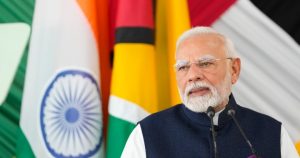How to fragment the global economy
Unlock the Editor’s Digest for free
Roula Khalaf, Editor of the FT, selects her favourite stories in this weekly newsletter.
This article is an on-site version of Martin Sandbu’s Free Lunch newsletter. Premium subscribers can sign up here to get the newsletter delivered every Thursday. Standard subscribers can upgrade to Premium here, or explore all FT newsletters
Greetings. The biggest news around the world is sadly more about life and death — in Ukraine, the Middle East and more — than about livelihoods. But there is important economic news too: we now have a more spelt-out economic policy programme from Kamala Harris and a policy platform from Michel Barnier’s new French government, which has only weeks to draw up a budget.
There have also been some fascinating new straws in the wind of global economic fragmentation. The week before last I asked what countries in between the global economic blocs would do if they were forced to choose between those blocs, and what sort of policies the blocs themselves could pursue to shape their choices. But as one reader has reminded me, I should justify the premise of those questions. Why would countries have to choose between blocs at all? How would they be forced to? Today I attempt some answers to that.
I am writing this from Berlin, where there is a palpable desire to “keep doors open” — with China above all, but more generally with just about everyone. As one businessperson told me, their company could not afford to cut off the Chinese market — then modified their argument to “well we could, and take the loss, but what good would it do?” It illustrates well that there is still much corporate resistance, in Europe at least, to downgrading economic ties even with geopolitical adversaries, and that it is very tempting to think that what is good for your bottom line is also virtuous politics.
Yet as my colleagues’ excellent series on the new economic nationalism last month highlighted, a lot of obstacles are being put in the way of trade and investment on national security and geopolitical grounds recently. (As you must be bored of hearing me repeat, this is largely a cause of regionalisation rather than general deglobalisation: the numbers suggest cross-border economic integration is intensifying within blocs while stagnating if not reversing between them.)
And while it may seem that these obstacles are mostly coming from a US and to some extent an EU afraid of China and determined to punish Russia’s warfare, all the blocs have been at it: it’s more than a decade since Beijing first blocked rare earths exports for geopolitical reasons.
But back to the in-between countries, those not closely aligned with any one bloc. Why can’t they play with everyone, and each bloc plays nice with them? Here’s a typology of sorts of the ways in which they may try to avoid being swallowed up by the cracks emerging in the global economic architecture — and what the big blocs can do to force them to choose sides.
The most obvious and discussed strategy is to turn conflict into a moneymaker by acting as “connector countries”, although a less charitable label would be “conduit countries”. One way is to insert oneself as an intermediate link in the supply or ownership chain. So we have more Chinese inputs into western factories sourced from Vietnam, for instance, or Chinese companies seeking stakes in Australian or Irish corporations using subsidiaries registered in Singapore.
This can work for a bit, but is no match for a large economic bloc whose desire to reduce exposure to another is for real and not just for show. The legal tools for frustrating intermediation already exist: rules of origin are there to apply tariffs correctly along the entire supply chain and not just the last country of shipment, and ownership restrictions can be defined by ultimate beneficial ownership, not just front companies’ registered headquarters.
This requires enforcement, of course. But that is simply saying that if economic blocs want to undo some of their economic integration, they can stop this sort of circumvention if they are willing to spend the real resources to frustrate what is essentially smuggling.
Then there is the second, more sophisticated strategy of tariff-hopping, where production is moved to a host country that is itself on better terms with the ultimate export market. Chinese car factories in Mexico and battery factories in Hungary are cases in point; because production now actually happens in the North American or European blocs, respectively (provided enough of it actually does, not just basic repackaging), tariff barriers no longer apply.
There are two things to note about this. It does not circumvent fragmentation; it constitutes fragmentation. Such tariff-hopping, after all, concentrates supply chains inside regional blocs that would previously have stretched across them — precisely what the fragmenters intend. There are still ownership stakes across blocs. But authorities have tools to reduce this too, as shown by examples from the US rejection of TikTok owner ByteDance to the German block on a Chinese takeover of two chipmakers. Wherever public procurement is involved, the tools are even stronger.
Third, the blocs can target technology. US export controls, which have ensnared European companies such as chipmaking tool manufacturer ASML, are by now familiar. But we are seeing ever more inventive technology transfer bans. Spain has blocked the sale of Spanish dual-gauge rail technology to a Hungarian company on security grounds. Madrid reportedly fears Hungary — which tries its best to be an “in-between” country no matter how inescapably it is tied into the EU economy — could share the tech with Russian interests. While this sort of tech can facilitate rail transport between the Ukrainian and Hungarian networks, it can presumably also be helpful for a Russian military supply train to cross faster into Nato territory should it desire to do so.
Equally dramatic is the US decision to ban Chinese car software in the US, which deals a blow to Chinese carmakers’ Mexican tariff-hopping strategy. (Check out my colleague Alan Beattie’s take on the software ban.) If Chinese-owned car plants in Mexico can put the cars together, but only without China-made inputs and only if they install western-made software in them, there is very little value added left for China to gain. What, then, is the point?
These tools overlap. Ownership restrictions can serve to prevent technology transfers, for example. But together, if enforced, they do not leave much room for countries to remain deeply integrated with multiple blocs if one of those blocs is determined to diminish links with the other. And we have not even talked about the scope for using outright sanctions, especially secondary sanctions. The US clearly can force financial institutions to choose between accessing the dollar-based financial system or serving whatever clients Washington has hit with sanctions; the vast majority choose to stay in the US’s good books (unless enforcement is weak, in which case they may try to get away with it until caught).
We have only scraped the surface of the potential for fragmentation from software restrictions (and data transfer restrictions that can have much the same effect). The consequences of the move on car software are far-reaching, as June Yoon wrote yesterday. And if cars, why not any other object with online functionality? If ever more things join the Internet of Things, and if the Internet of Things becomes the Splinternet of Things, then software and data restrictions quickly become blockages of physical goods trade.
What is left for in-between countries is, perhaps, the option to join in several parallel supply chains at the cost of duplication, or to trade just the sort of basic goods and raw materials that are in demand in all blocs. That is not an attractive alternative to choosing sides.
In sum, the big blocs have much greater tools to force a regional fragmentation of the global economy than they have yet tried to use. Whether it would be wise to use them is a different question. But it would not be wise for in-between countries to think they can forever avoid choosing sides.
Other readables
-
The far right came first in Austria’s election last weekend. To understand the FPÖ, read Sam Jones’s pre-election deep dive.
-
Here are two interviews worth your time. Signal’s Meredith Whittaker has Lunch with the FT, and Greg Jackson talks about Octopus, the British energy-cum-tech success that he runs.
-
The Peterson Institute has the most succinct guide I have seen about why Donald Trump’s promised tariffs (and by extension Joe Biden’s actual ones) will not bring the benefits claimed for them.
-
The disruption of artificial intelligence appears in unexpected places: Mumsnet is suing OpenAI for scraping its content.
Recommended newsletters for you
Chris Giles on Central Banks — Your essential guide to money, interest rates, inflation and what central banks are thinking. Sign up here
Unhedged — Robert Armstrong dissects the most important market trends and discusses how Wall Street’s best minds respond to them. Sign up here
#fragment #global #economy





